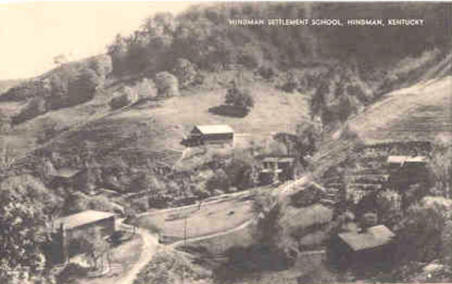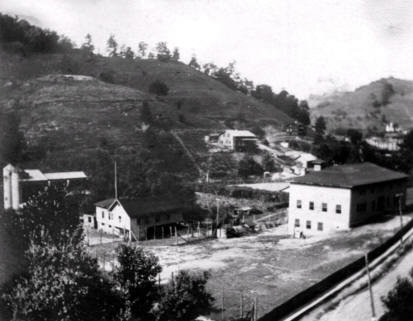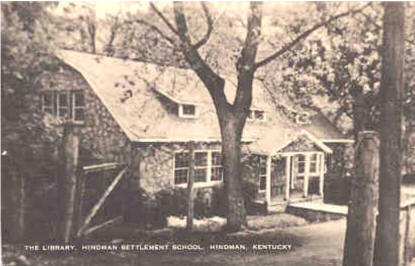“The Mountain Schools”

Hindman Settlement School, Hindman Kentucky
The lack of educational opportunities for girls living in the Appalachian mountains was the subject of a stirring speech given by popular Lloydsboro Seminary instructor, Miss Edith, in “The Little Colonel at Boarding-School.” Her speech inspired Allison Walton to form a Shadow Club to raise money for the girls of the mountain district.
From “The Little Colonel at Boarding-School,” Chapter IV, “The Shadow Club”:
“I want to tell you a little incident that fastened it in my memory. I have a friend teaching in one of the mountain schools of Kentucky, who told me of two girls who came to the door one day, asking to be admitted as students. Each carried a bundle of clothes wrapped in a newspaper. That was all they had — no money to pay their tuition, no way of paying their board unless they were allowed to work for it. They had walked forty miles to get to that school. Their home was twice the distance away, but their uncle, who was a tin pedlar, took them half-way in his wagon. They were a week on the road after they left him, where his route branched off from theirs. They stopped at night in some village or farmhouse to which he directed them.
“Nobody had the heart to tell them that there was no room for students who could not pay their way, neither could any one turn away such ambition. But the school was poor. It is kept up by donations from benevolent people, and it was only by great self sacrifice that the teachers could take them at all.
“The following vacation, while I was at the seashore, I had a letter from this friend, and happened to speak of it and the two girls to a wealthy lady whom I met there. She seemed so interested that I read her my friend’s letters. They were so full of the struggles and hardships of those mountain people that she was greatly interested and touched. and began corresponding with the principal of the school herself. The outcome of it was that she sent a check for ten thousand dollars to endow scholarships. Of course these two girls were the first to be benefited by the gift, and next June they will be graduated from the school with honour. fitted to become teachers themselves, far in advance of the time it would have taken had they been obliged to work their way through. Instead of plodding along, using the greater part of their time and strength in laundry work or sewing, they could go on with the college course uninterrupted. They are going to start a school themselves in the mountains, nearer their own home.
“Now that lady never saw those girls, and they were as unconscious that their influence was touching a life a thousand miles away as that tree out yonder, throwing its shadow across on the Clovercrofthttp://www.littlecolonel.com/Clovercroft.htm lawn. They simply stood in their places and reached out as far as they possibly could after what was good and high and worthy in life; but for years and years to come, students who profit by that endowment will be grateful for the shadow cast by those two ambitious girls.”
Miss Edith never preached. She did not go on to tell them, as Miss McCannister would have done, that they were responsible not only for the influence of their daily living upon others, but for the effect their shadow-selves might cast on others far beyond their reach. She only pointed to the flaming red leaves of a gum-tree outside the window, and the shadow swaying partly on the high picket fence, and partly across the Clovercroft lawn, then passed the albums back with a smile. Then the girls filed slowly out to chapel.
It was a warm October day, and as Allison took her seat by an open window in the history class an hour later, she found it hard to fix her thoughts on the old French and Indian wars. It was so much pleasanter to look with dreamy eyes through the haze of the Indian summer, which Mom Beck said was the ghost-smoke from the peace-pipes of old dead and gone chieftains.
She watched the slow fluttering to earth of the pale yellow maple leaves, and listened to the soft rustling of the gorgeous red leaves on the gum-tree to which Miss Edith had pointed. Once or twice she started, recalling her thoughts to the history lesson with an effort as she remembered the girls who were hungry enough for an education to walk forty miles for it and work for their board. She thought vaguely how eagerly they would have improved their opportunities had they been in her place. They would have taken a lively interest in the old wars, instead of sitting in idle day-dreams.
All at once, as Allison watched the swaying of the gum-trees shadow on the fence and lawn, a thought came to her that made her seize a pencil and a piece of paper. Writing notes was forbidden in Miss McCannister’s classes, but Allison could not wait until recess to share her brilliant thought with Lloyd. With her big eyes fixed innocently on Miss Bina’s fishy ones, she scribbled slowly on the paper without once looking down: “Let’s form a Shadow Club, with Miss Edith’s verse for a motto. A. W.” It took much manoeuvring to succeed in passing the slip of paper to Lloyd, who sat several seats in front. When it finally reached her she did not dare turn round to nod a pleased assent, but Allison knew that her suggestion was received favourably, for Lloyd’s hand at once went up to readjust the bow at the back of her hair, and two fingers wagged violently for an instant out of Miss Bina’s sight. Had it been her thumb, Allison would have interpreted the signal to mean no; but from the rapid wagging of the two fingers she knew that Lloyd was much pleased with the idea.
Allison’s plan, as she outlined it to Betty, Lloyd, and Kitty at recess, in one of the swings, was to form a club that should be not only fun for themselves, but of some real benefit to the girls of the mountain districts. The Christmas before, the little circle of Busy Bees, to which Elise belonged, had sent two barrels of clothes and toys to them, under Mrs. Clelling’s supervision. She had organized the circle, and was deeply interested in the work. Now Allison proposed that the club should earn money for the same purpose.

Hindman Settlement School in 1912
The mountain schools which Miss Edith describes were a new phnomenon in 1904, the year “The Little Colonel at Boarding-School” was published. Known as “settlement schools,” they were patterned after urban social settlements, such as Jane Addams’ Hull House in Chicago and the Cabbage Patch Settlement House in Louisville. Their mission was to educate children, provide needed community services and expand the awareness of Appalachian culture, including writers, storytellers, musicians and craftsmen.
The first of these schools was the Hindman Settlement School in Knott County, Kentucky, which opened in 1902 and attracted instructors from prestigious colleges such as Wellesley, Smith, Mt. Holyoke and Vassar. Eleven years later, in 1913, the Pine Mountain Settlement School opened its doors in Harlan County, Kentucky. For a complete history of Kentucky’s settlement schools, see the 1995 KET Production, “Settlement Schools of Appalachia.”
The mention of the mountain schools in “The Little Colonel at Boarding-School” is one of many instances where Annie Fellows Johnston uses the power of her pen to promote social causes that were dear to her heart or the hearts of her friends. As a former school teacher, she undoubtedly was interested in the success of the mountain schools. She was also an associate of Alice Hegan Rice, author of Mrs. Wiggs of the Cabbage Patch. (For more on AFJ’s friendship with Alice Hegan Rice, see “Home of George Madden Martin”) Hindman Settlement School founders, May Stone and Katherine Pettit, visited the Cabbage Patch Settlement House, as well as settlements in Chicago, New York and Tuskegee, Alabama, as they were forming the model for their school.
Finally, according to a “Louisville Times” article dated November 27, 1920, she “made a contribution to a fund to pay expenses incurred by the Pine Mountain Settlement School in the investigation of the murder of Miss Lura Parsons.”
This was about the time she was working on a new adult novel called “A Mountain Mailbag,” revolving around the struggles faced by young Appalachians who wanted an education. She made several visits to Berea and the neighboring hills between 1919 and 1920 in search of source material, and made the following entries in her diary:
I talked to the children at the little school above Scaffold Cane. I never saw brighter, more alert children. They were so friendly and dear I wanted to stay and teach them myself.
I went out with the Book Wagon, the sides being all bookcases, drawn by two horses…They were all so eager for books, flaxen curly headed children and the men who left their work, painting a house, feeding the hogs, plowing, anything to come down to look over the books, always taking several for themselves and asking us to “choose one for the woman.”
Unfortunately, “A Mountain Mailbag” was never completed, but the unfinished manuscript is in the possession of Berea College.

The Library, Hindman Settlement School
page by Donna Russell